Sara Alexi's Blog
October 31, 2017
Book Blog Tour - The Other Daughter

My new book The Other Daughter is out tomorrow, and to celebrate I am going on a Book Blog Tour with some fabulous bloggers!
Here is the synopsis:
The Other Daughter by Sara Alexi is a compelling and gritty tale, set amongst the wild moors and crooked streets of a Yorkshire Village, following one woman who finally untangles herself from the clutches of a painful past and a self-centred mother.
More than a decade after leaving home Dawn finds herself stuck in a dead-end job, in a rundown flat, while her sister has it all - the husband, children and prestigious job in sunny Australia. Their mum’s favouritism is palpable, and even as she has a terrible fall leaving Dawn to pick up the pieces, nothing Dawn does can live up to her perfect, absent sister.
But still Dawn persists with taking care of her aging and fragile mum, until one day it begins to feel like the only thing standing between Dawn and her happiness is her mother's continued, pitiful existence...
Here are the links and the dates:
https://aloverofbooks.wordpress.com/ - @destinylover09 / Weds 1st Nov
http://beinganne.com/ - @Williams13Anne / Thurs 2nd Nov
http://rachelsrandomreads.blogspot.co... - @gilbster1000 / Fri 3rd Nov
http://shortbookandscribes.uk/ - @shortbookscribe / Sat 4th nov
https://portobellobookblog.com/ - @portybelle /Sun 5th Nov
https://chataboutbooks.wordpress.com/ - @bellaboobos11 / Mon 6th Nov
https://bookslifeandeverything.blogsp... - @bookslifethings / Tues 7th nov
http://www.jerasjamboree.co.uk/ - @shazgoodwin / Weds 8th Nov
I hope you enjoy!
Published on October 31, 2017 05:48
August 9, 2017
New release: The Village Idiots - Part 1 'Inheritance'
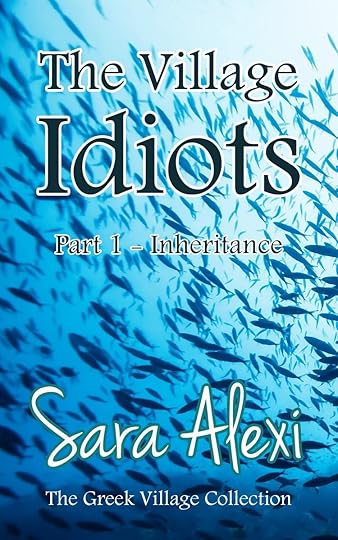
For those who don't know, I have been writing a trilogy of novella's called The Village Idiots. As you can tell from the title, you can expect lots of Laurel and Hardy-esque shenanigans all set against the beautiful back drop of our much loved Greek Village. I hope you'll find it a winning combination!
There are, as ever, some slightly more serious undertones. But I'm hoping this late summer read will help keep your mind in the sunny climes of Greece that little bit longer.
Here is the synopsis for Part 1 'Inheritance':
First in a trilogy of novellas, The Village Idiots sets the scene for a comedy of errors in a sleepy Greek Village, as two friends find themselves sinking deeper in to trouble with each bad decision they make.
Spiros is a simple man who is easily led astray, but who has rarely wandered further than the village and its surrounds. Older, slightly more wayward and most definitely not wiser, Takis has spent his years taking Spiros under his wing, whilst taking advantage of his younger friends naivety.
When the duo, who often scrape by in life to make a living, discover they are heirs to an estate, they mistakenly believe that their ship has come in!
As they discover their inheritance is not all as it seems, Takis begins to plot their way out, dragging poor Spiros with him. As one escapade spirals in to another, Takis is easily lured by the money signs while Spiros finds his eyes are being opened to a wider world.
Amidst the ouzo and the scheming, this charming and comical tale will leave you eagerly awaiting the next instalment!
I have also put a tester chapter up on Goodreads for you here https://www.goodreads.com/story/show/...
Happy reading :)
Sara
Enjoyed this preview? Buy the book on Amazon >>
Published on August 09, 2017 01:20
•
Tags:
beach-reads, greece, sara-alexi
July 6, 2017
Greek Village Cooking - The Short and Happy Tale of Pippo Alampo

Write a cook book? Me?
It seemed a most extraordinary idea!
I am not someone who spends hours in the kitchen, I like things to be super quick and I like minimum of fuss.
But then I realised that perhaps this is exactly how I should plan the cookbook and exactly what most of the traditional Greek food is about, which exception perhaps of their sweets.
So I decided to put together my favourite easy cook recipes, with no flashy ingredients, no hours of preparation... In fact It takes me longer to go to the market and buy the ingredients than it does to prepare and cook, but as the market is only twice a weekly I tend to stock up.
The result is just good food cooked from fresh produce.

The main staples in Greece are vegetables, with meat being left for celebrations, so with this in mind I have concentrated on the vegetarian and vegan dishes which can be eaten as a main plates or can be as a side serving.
These are dishes I eat day in day out and I love them.
Strangely I don’t mind spending time over the Greek sweets - I'm not sure why, maybe I am a baker and not a cook, but I could spends hours crushing nuts and brushing melted butter on filo pastry.

So these do take a little more effort but I can assure you, that if you don’t eat them immediately, they will last for days and the consistency only gets better as the ingredients bind.
So I hope there is a little something of everything for everybody, but as I am more a storyteller than a cook I introduce all the recipes through a lovely little tale - The Short and Happy Tale of Pippo Alampo.
Want to know more? Buy the book on Amazon >>
Published on July 06, 2017 00:33
•
Tags:
cook-book, cooking, greece, greek-food
May 30, 2017
New release: An Island Too Small
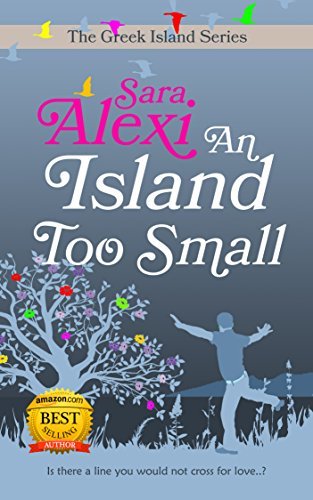
It's with great excitement that I can tell you all it's time for my latest book to be released!
An Island too Small will be available on Sunday 4th June, but in the meantime I wanted to give you a sneak peak of the cover and the synopsis.
High up in the sun soaked hills of the Greek Island of Orino, An Island Too Small is a tale of suspense and emotion which unravels the complex webs woven over years by unfulfilled lovers and dishonest friends.
When Nefeli’s mother dies, much to her surprise, she discovers she is to inherit a cottage on Orino Island. Nefeli's parents didn't ever talk about life on the island, and it is only as Nefeli begins to acquaint herself with her new home that their reasons for secrecy start to become clear.
Set up in the town’s hill tops, many steps up from the port, Nefeli's new neighbour Adonis and his cantankerous mother Koula also live, sharing just two rooms between them. Adonis, yet to find his way in the world, is a handsome man who makes a living providing company for female tourists and then selling the gifts they buy for him. But it's hardly a steady job and Adonis regularly lives hand to mouth.
Not one to be taken in by good looks, Nefeli finds there is a strong connection with Adonis which is more than skin deep, and it is a connection that neither of them can ignore. But their lives are already intertwined more than they realise and Koula has other ideas, going to great lengths to keep Nefeli and Adonis apart.
What secrets are being harboured by Koula, driving her to stop a burgeoning love? What will Nefeli and Adonis discover about their past, and will they be able to defy Koula’s meddling?
As tensions build and dark twists are exposed, find out if love can prevail over deceit.
You can pre-order your copy of An Island too Small today right here https://www.amazon.co.uk/books/dp/B07...
Happy reading :)
Sara
Published on May 30, 2017 07:57
•
Tags:
an-island-too-small, greece, sara-alexi, the-greek-island-series
April 11, 2017
A Personal Memoir of Greek Easter back in the 90’s
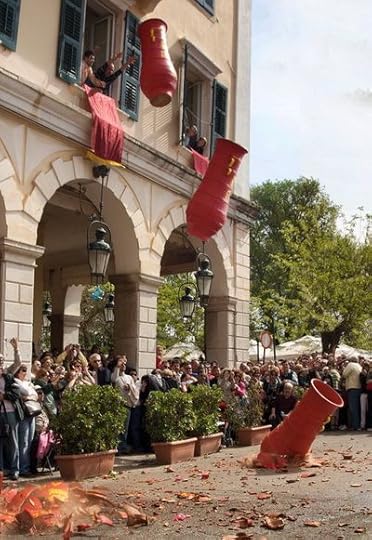
Easter is by far the biggest day of celebration in Greece (and there are many!) and it is full of laughter, with families coming together to observe quirky Greek traditions.
The Easter I remember most clearly is from the early 90s when I took a trip to Corfu with a girl friend. We were young and open to anything. We had little need for sleep and were eager for adventure.
I remember we became friendly with a group of gypsies, and were invited into one of their tents where we drank coffee and played with their children. I got lost in the hills, and watched Albanian refugees being rounded up by the police at the port. Some of the refugees were clearly known to the police, who greeted them by name and shook their hands before sending them off on their way back to Albania, as if it was a daily occurrence (it probably was!).
My abiding memory of this particular Easter was not the lavish feasts, nor the hoards and hoards of people in the streets, but a tradition that is unique to Corfu - the throwing of pottery from the balconies and windows to smash on the streets below. No-one I asked seemed to know where this ritual had come from but as we watched the women of the house threw things they no longer wanted, and seemed to have a general clear out of odd bits of ceramics.
The crowds backed to clear a space and the shards of pottery filled the streets, crunching under foot. I have heard since that it is done to make a noise to frighten away the devil.
All I knew at the time was it was fun to watch as it came with a sense of organised chaos. I still have a shard of pottery, painted bright blue, that I took as a keepsake.
Today of course the tradition has become bigger and I suppose the theory is ‘better’.
The clearing out of old pottery seems to have been replaced with enormous purpose thrown pots as much as five feet tall called ‘botos’. These are held teetering on the balustrades over the street, and the people below, now safely behind police barriers, count down from ten to one, and break into thunderous applause when these enormous earthenware pots are allowed to fall to the ground.
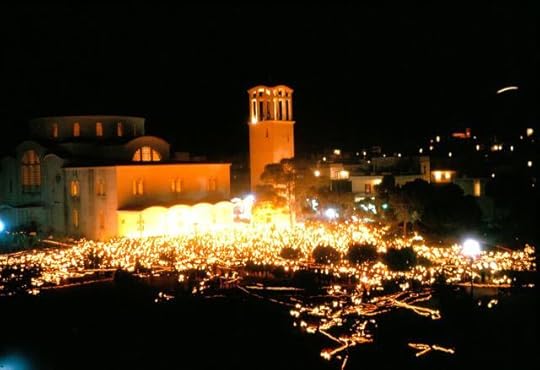
My other favourite, which is of course not limited to Corfu, is at midnight where all over Greece the priest announces ‘Christos Anesti!’ - ‘Christ is risen!’ and the holy flame is passed from candle to candle, a sea of light spreading ever outward, to be carried home where the sign of the cross is marked above the door in soot for good luck and God's blessing for the year to come.
Published on April 11, 2017 02:52
•
Tags:
celebration, easter, greece, sara-alexi, the-greek-village-series, tradition
April 4, 2017
New release: The Housekeeper
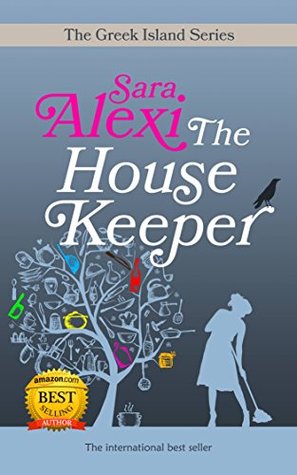
I'm very excited to announce the release of my latest book The Housekeeper, and have decided to let you all have a sneak peek in to the book with an excerpt from the first chapter below.
But first, here is the synopsis to give you give you an idea of what you'll be reading:
A tale of love and heartbreak, taking us back in time to the idyllic Greek island of Orino, where the secrets and ill-fated love of one young woman are relived in a bid to save another from the same mistakes.
As a young woman, Poppy travelled to Orino Island as housekeeper for a wealthy family. A romance burgeoned between Poppy and Pantelis, the owner's son, but a tragic turn of events led him to cruelly abandoning her.
With no option but to stay on at the empty house as the housekeeper, Poppy was thrown into a predicament when Pantelis eventually returned with a pregnant new wife who, after giving birth, had no interest in the upbringing of her own children.
Left in her care, could Poppy bring herself to raise Pantelis's children by another woman? And what became of the feelings Pantelis once had for Poppy?
Now nearing the end of her life, and recovering from an accident that has left her bed-ridden, some news about Pantelis means Poppy must come to terms with the course her life has taken, and in turn she must try to stop her good friend Juliet from making the same mistakes.
Unable to turn back the clocks, will there be time to save someone else’s future?
Excerpt from Chapter 1:
She's forgotten to put her shoes on again. The heels of her slippers betray their presence, whispering shushhhh with every step as they drag across the village square. At least they are her black slippers and are still reasonably new. Her old purple ones, now matted with hair from the cats curling up on them over the years, squashing them out of shape and clawing them beyond recognition, are still the more comfortable of her two pairs. But right now, she would rather have the stiff discomfort these cause because, in passing, they can almost be mistaken for backless shoes worn to match her black skirt and her faded black blouse.
Shushhh, shush, shush. She tries to pick her feet up to stop the noise as she passes the kiosk.
'Morning, Poppy.' Vasso peers out above the pile of newspapers she is organising inside the serving hatch of her small wooden emporium.
'Morning.' Poppy's throat is dry and the word comes out cracked.
She coughs and tries again. 'Morning.'
This time the word is intelligible. A chat with Vasso will give her a moment to rest her legs. Maybe she will buy a bottle of water to lubricate her throat. But Vasso is no longer visible, hidden behind her growing stack of papers, obscured from view. So Poppy keeps up her steady tread, across the square. The kafenio to her left abuts the blank wall of the cheese factory. She will head up that way, walk in the limited shade it offers, a hand on the featureless wall for support.
Poppy glances up and down the road, hesitant to cross. Cars and bikes come so quickly these days, faster than she can move.
'Morning.' Theo passes in front of her on his little motorbike and pulls up outside the kafenio. He takes a shopping bag from the handle of his bike and trots with ease up the three steps into his masculine haven.
When she first came to the village, way back when she was only a child, it was Theo’s grandfather running the kafenio – a tall man with a mass of black hair except for a shock of white that flopped over one eye. She found him frightening back then. In fact, the kafenio itself, a place where men went to hide from their wives and put the world straight with tireless talk about politics in a fog of cigarette smoke, was generally unsettling. Without a father figure in her life, men were a mystery to Poppy.
'Fools, every one of them,' she mutters to herself, and she catches in the establishment’s well-polished windows the reflection of her own white fluffy crown of hair framing her wrinkled face. Quickening her pace across the tarmac, she pauses at the other side, takes a breath, her supporting hand feeling the years of the whitewashed plaster of the wall of the cheese factory.
It’s been a while since she has headed in this direction. Not that she is so very far from her house and the shop – it’s just that she seldom has any reason to come across to this side of the square and use this particular road.
Feeling a little rested, her feet shuffle forward again. Her hips are less stiff now; the rest must have done them good as it is becoming easier with every step.
'You need to oil your joints!' she tells herself, and she chuckles at her own humour.
'Where are you going, then?' A light step reaches her. It is Thanasis, and with him comes the smell of the donkeys he breeds and the hay he feeds them. It’s a comforting smell.
'That’s for me to know and no business of yours,' she snaps, but a little smile creases her lips. Over the years she has come to feel that Thanasis is not like the other men – he keeps himself to himself and doesn't ask questions. Well, usually he doesn’t.
'That’s true enough.' His tone of voice tells her that he is not offended by her sharp retort. 'Well, you have a rather hot day for it, whatever it is you’re up to.'
He has not fallen into step with her; his pace remains brisk and he is pulling away, but as he goes he turns to look back at her. He may be an old man, but his eyes still dance and there is life in his limbs – no aching hips for him! That’s what an active life will do for you.
'Have yourself a good day.' Poppy’s wish is heartfelt.
'And you have yourself a fine day too.' And off he strides.
'A nice man,' Poppy says and, unbidden, her heart twists at the memory of two young people, and the day she had to watch them walk away from her. Her age seems to be doing this to her these days – dragging her back to relive times she would rather forget, forcing her to dwell on memories that are best left buried.
'How tiny they were.' She can vividly recall the backs of the little ones walking away from her in a memory so etched into her soul that it twists her nerves and makes her eyes water every time.
If you enjoyed reading this, you can order your copy here: https://www.amazon.co.uk/dp/B06XX26CM...
If you want to be first to know about new book releases then why not join the Sara Alexi VIP club here? http://saraalexi.us10.list-manage1.co...
Published on April 04, 2017 02:38
•
Tags:
contemporary, fiction, sara-alexi, the-greek-village-series, travel
March 23, 2017
Ask Sara - A reader / writer Q&A with David Horning

In hopes of getting to know you better every so often I pull a name from a hat and ask the person to tell me three things about themselves and then ask me three question. Today David Horning is in the spotlight.
So David what will you share and what will you ask?
My roots:
I'm a Native of Oregon -- That is, I was born here and have lived here all of my seventy years. I was raised, until I went to my first grade of school, on my grandfather's homestead., in the central part of Oregon. During that time we had no electricity and I grew to appreciate those who toil and produce with mainly their bare hands. Many do not know, because of Oregon's renown for its amount of rainfall, that the part of the State which lies west of the Cascade Mountains is hot, and dry. The area known as Central Oregon is arid and during the summer can be quite hot while often bitter cold during the winter. It reminds me of the dryer parts of Greece.
Marriage and Family:
I am married to my wonderful wife of 50 years, Sandy and I have 3 grandchildren and a 4th on the way. Together we have traveled to Greece several times and have friends in Nafplio, near where Sara lives. One of our favorite places on earth is Hydra Island (Orino Island, in the Greek Village Series).
Other loves:
My greatest love, besides my wife and family, is doing just about anything creative. My hobbies include watercolor and/or soft pastel painting; photography and writing. I participate in a fabulous writers group, with whom Sandy and I meet every Friday, to read, share and critique what we have written during the prior week.
And here is what David asked me:
Why you live where you do:
When did you first visit Greece; what led you there and why did you choose the Argolida area of the Peloponnesus in which to settle and live?
I first visited Greece on holiday. My friends had booked a two week package to Crete and I tagged along and slept o their floor. But my flight returned after a week and I did not want to leave. I felt I had come home when I was on Crete. But I took my flight and arrived back in the UK to pouring rain. The downpour was so hard the coach that took me from the airport along the motorway to my home was travelling at ten miles per hour the visibility was so poor.
I alighted from the coach and I intended to run through the splashing rain to the station to get the train I needed to my little Yorkshire Village, but my feet took me back to the travel agents. The next day found me back in Crete, much to the surprise of my friends. But this time I had a tent and it was I who waved them goodbye the next week, and I stayed until I ran out of money.
Since then I have lived in Athens, Galatas, Aegina and finally settled in Nafplion. I considered living in Hydra and went to look at several houses there, houses that are now ten times the price they were when I started looking! But I wondered if island life might become just a little too insular for me, as an outsider. I think Nafplion was the place I put my roots party because it was so pretty but mostly for practical purposes; it seemed big enough to hold my interest and near enough to Athens if I needed a ‘city’ fix and only an hour and a half from the airport.
About your writing process:
What part of writing is the most difficult for you? For example: Do you write and rewrite and maybe even re-write again before your satisfied with your story? Your characters are often complex and one of my favourite parts about your writing - do you find developing these characters a challenge?
I start with a vague plot around a character. It is usually very small, like a dream half remembered, and I spend time trying to catch more of it, to make it solid. When I do I try to create its form, I see the ending but then the aspects of the character begin to define what could and could not happen to them. For example a shy character is unlikely to talk to a stranger at a bar, and an over confident extrovert is unlikely to say they need someone’s help. So the character begins to guide my ideas.
The first chapter or two takes several days to write and re-write as I am not only starting a story, but also trying to capture a mood, to let the reader know enough about the character and generally set the stage. This part is a struggle and even though I am excited to begin a new tale I always wish bit was easier.
Once I have begun I have a rule: “Do not read over.” If I look back I become stuck in a loop of writing and rewriting and there can be no end, I would never consider it perfect. One of the idioms I came across in my psychotherapy training was: if in doubt of your abilities remember that you only have to be ‘good enough.’ as your role is an enabler, you cannot do the job for the clients, this they must do themselves. So I have taken this thinking into my story writing. I am not trying to create ‘Great Literature', but instead to share wonderful uplifting stories that allow the reader to slip into a positive place if they wish to and, hopefully, in this way the books make the world a slightly happier place.
As for developing the characters I think this is my drive. I have always felt that I do not understand the world as others seem to and so my quest has always been to try to figure out how other people work, to really understand them. The book I am currently writing, from this aspect, is quite difficult. I feel I share nothing personally with the character and so I am having to work hard and think deeply about how his motivations and thoughts are connected.
As I continue to write I find that starting a new book is more and more like taking on a new counselling client. I have to assess whether I have the reserves of energy to take on the new ‘client/character’, and whether I can truly love them no matter what they have done or will do in the story, because if I do not love them then how can the reader be expected to?
Future Holidays:
When you travel to the United States, will you come to Oregon and look us up? We would love to show you around our marvelous state.
I so want to come to the USA. I am not only driven to see your country but I also want to meet so many people I have been talking to for so long on social media. However being the character that I am the last thing I want to do is disappoint anyone and I am afraid I suspect that my books are far more interesting than I am, as I can be quite shy at times, and in truth, perhaps rather boring!
If you want to join in the Village shenanigans and for a chance to take part in Ask Sara, then do come and find me and friend me on Facebook here https://www.facebook.com/authorsaraalexi
Finally, If you want to be first to know about new releases, competitions and news then come and join us at the Sara Alexi VIP Club here http://saraalexi.us10.list-manage1.co...
Published on March 23, 2017 01:51
•
Tags:
ask-sara, fiction, sara-alexi, the-greek-village-collection, travel
March 8, 2017
A Greek Lent: Kyra Sarakosti and Her Seven legs
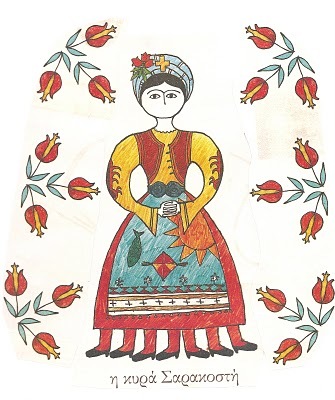
Clean Monday (the first day of Lent, when brightly coloured paper kites are flown throughout Greece) has now passed and Lent is upon us, so this post might perhaps be considered 'old news'.
But I thought I would share with you one of the stranger traditions that is observed on Clean Monday or before! It involves the baking of biscuits or the making of paper cut outs, or in some areas actually in fabric with added feathers and other decoration, in the shape of a woman wearing a long skirt, known as Kυρά Σαρακοστή.
Poor Kyra Sarakosti! Whether of biscuit or paper or fabric she is not given a mouth as she represents the fasting that is to follow.
Nor does this poor woman have any ears, as she does not indulge in listening to gossip.
Above her head, woven into her headdress or hair, is the sign of the cross and her eyes are more often than not depicted closed, as if she is in prayer.
All this is designed of course to remind us of the purpose of Lent. Often she is depicted as a nun to remind the onlooker of the sort of behaviour we are supposed to emulate at this time, but sometimes she is shown as a simple and pure peasant women who has not been distracted by the modern ways of the world.
Even her name is relevant - Sarakosti means Forty, referring to the forty days of Lent.
But what amuses me most about Kyra Sarakosti, and has no doubt captured the imaginations of many children is that she has seven Legs! These are to keep track of the number of sundays before Easter, and each Saturday, if the doll is of biscuit or indeed paper, a leg is removed, so by the time Pascha (Easter) has arrived she has no feet at all (or we might say she is legless!)
When the very last leg is removed tradition dictates this it is placed in a bowl of fruits and nuts and whoever finds it will receive a special blessing until the next year.
In some households the ‘winner’, if the doll is a permanent fabric one or the like, writes his or her name on the back as a keepsake.
I don't know whether to laugh or cry when I think of poor Kyra Sarakosti... Could YOU cut her legs off and eat them, one by one!!??
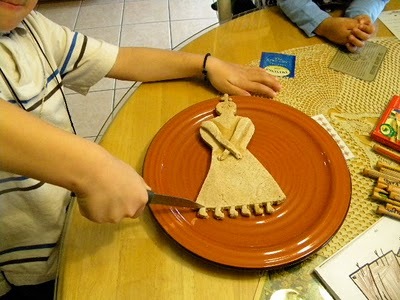
Published on March 08, 2017 05:13
•
Tags:
greece, sara-alexi, the-greek-village
February 14, 2017
Ask Sara - A Reader / Writer Q&A with Pam Forrest Spann

Phew, it's been an exciting couple of months with the release of my latest book The Piano Raft, and starting not one but TWO new Greek Village Series books almost immediately afterwards.
But if there was one thing I wanted to make sure I found time for amongst the whirlwind of writing, it's something that gives me great pleasure; Ask Sara.
I really do enjoying getting to know my Village friends on Facebook and in turn telling a little more about me. And it seems other Village friends enjoy it too and appreciate getting to know more about each other.
For this Ask Sara, I asked Pam Forrest Spann to tell me three things about herself and to ask me three things about myself.
Here is what Pam told us:
I am passionate about supporting public schools where every student is accepted and taught by teachers that want the best for each child. I have been a public-school teacher for 26 years. I teach prek in the Texas public school where I started 1st grade nearly 60 years ago.
I have only recently become a world traveller. I went to Copenhagen and Paris last summer and Progresso, Mexico for Christmas. I can’t retire anytime soon or I won’t be able to afford the trip to Greece!
I absolutely love to read and have so enjoyed my “trips” to Greece and Great Britain through Sara’s books. I love to pass on my love of reading by promoting reading aloud to children. There is nothing a parent (or other adult) can do to ensure a love of reading and success in learning to read than to read at least 20 minutes a day to your child. Have your read a book to a child today?
And here is what Pam asked me:
Did you attend public schools?
To clarify, in England a public school refers to a fee paying school, and as such is not public at all, but confusingly private!
There are state schools (free to all) and public schools (fee paying).
I believe my kindergarten school was state run, but then for some mad reason known only to them, my parents sent me to a fee paying convent school for two years, where I did battle with the nuns...
My parents have no clear religious feelings, and are certainly not Catholic, but the experience was a serious eye opener for me, and introduced my young mind to the concepts of hypocrisy and negativity.
The nuns were bullies who delighted in accusing us of anything they could. I still feel anger, and disbelief, at the way they treated me when I was only six years old!
After that I attended state schools until the age of thirteen, when I was sent to a grammar school. My schooling on the whole was poor, and I have many gaps in my knowledge. My dyslexia was never diagnosed. My personal belief is that teachers should be paid the highest wages, to attract the brightest and best, above politicians and bankers, as they are moulding our future, and what could be more important than that?
Have you travelled in the United States?
I must cry a loud and mournful NO to this one! I have wanted to visit for years. When I was younger I could not afford it, and then, when I was in a position to scrape together the air fare I was nervous of going alone, so I arranged to come with my daughter but then she couldn't come...
I am beginning to feel I am destined to never see the USA! I would love to do a tour, I cannot think of one state that I would not want to visit so it might be quite a long tour!!
Being the geek I am I have even learned all the states and where they are just in case I ever get to go. I feel that with it being such a large country there must so much diversity amongst the states and people, I want to see how, let's say, the people of New Hampshire differ from those of South Dakota. So interesting!
How do you write so fast and still do such a great job of coming up with completely new ideas?
I love writing and I will spends hours and hours at the keyboard. The stories just have to get out of my head and onto the paper (hard drive!) so it is also a relief to make progress.
I am very self disciplined. I do not allow myself to do anything else until I have completed my work. I work seven days a week, and if I lose a day I try and make it up over the week.
Occasionally I give myself a day off but then think 'I will just write 500 words for fun,' and end up doing a normal day.
My word varies between 2200 to 3000 words a day. I find that it is the emotional content in the stories that tires me, so after I complete my word count I need to leave it till the next day - it's too tiring to continue.
But just recently I have found that although I might not be able to continue with that story, I feel fresh as a daisy for a new story.
So this last week I have been writing two novels in tandem and it seems to be working out very well indeed! Fingers crossed tat I can continue!
As for finding new ideas, they just seem to come to me. I am constantly enquiring into everything I see; I people-watch a lot when I am out and when/if I watch television I often do so with the sound turned down. I find the words people say is what they want you to believe of then, and are often a distraction and I can feel so much more by a person's body language. I then extrapolate the character I think I can see and if they are interesting or unique then often a story forms by itself.
Thank you Pam!
To find out about my last book The Piano Raft follow this link https://www.goodreads.com/author_blog...
And if you want to join in the Village shenanigans then do come and find me and friend me on Facebook here https://www.facebook.com/authorsaraalexi
Finally, If you want to be first to know about new releases, competitions and news then come and join us at the Sara Alexi VIP Club here http://saraalexi.us10.list-manage1.co...
Published on February 14, 2017 04:31
•
Tags:
ask-sara, greece, reader-q-a, sara-alexi, the-greek-village
January 30, 2017
Adrift and Immersed. Research for the story of The Piano Raft
I admire people who can write, drawing on the workings of their mind, as I cannot. I have to see and feel and smell the things I describe, and I’ll often research situations, locations and characters.
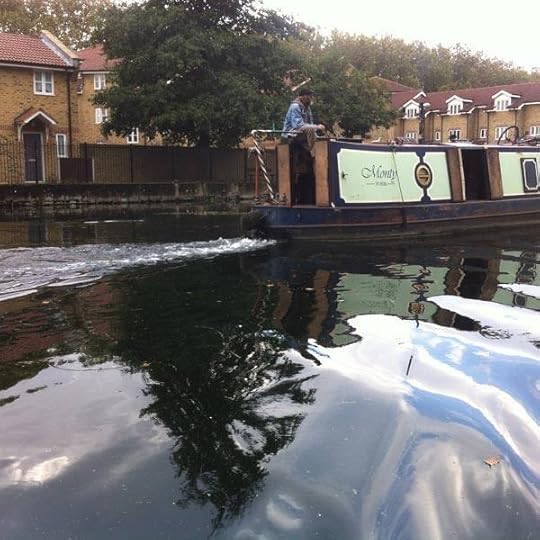
One such piece of research found me dressed as a Goth, in a feather-trimmed purple dress and a black wig in a small village in Yorkshire. I had an idea for a character, and I wanted to see how people reacted, to better understand the mind-set of my character. As it has turned out I was side tracked and this character’s story is yet to be written.
For no particular reason I found myself heading down to the canal, where I came across a rather odd raft. This misshapen floating pile of sticks had such an impact on me that I had to investigate. The man on board told me he was delivering a piano down to London, on the raft, but he seemed to have no real plan or reason for doing what he was doing - he just seemed to have this vague idea of floating down to London to deliver the remains of a pretty waterlogged and disintegrating piano. I asked who he was delivering the instrument to, thinking that by the time he got to the capital city there was very little chance that whoever the person was would still want it. But it seemed that he had no real recipient for the unplayable instrument. His story was jumbled, but I slowly gathered that he was a performance artist and that he planned to create a puppet theatre on the raft, among other things. I left him to his world but the story of the piano raft had already formed almost in its entirety in my head before I got back to my car, where I pulled off my black wig and wiped away the last traces of my deep purple lipstick. The Goth research would have to wait for another time - I was all fired up with this new story.
Back in my jeans and T shirt I spent the rest of the day walking along the tow path, and later I followed the path further afield on Google maps (Oh bless Google maps!). But what I really needed to know was, what is it like to float for days, live at the pace that the canal flows? How does that affect you?
It is often the way when I have ideas like this, that fate seems to co-ordinate to al-low them to happen. In this case a person I had only recently become friends with happened to mention that she needed to go and visit her mother for a few days, and did I want to stay on her canal boat in central London whilst she was away? I think she was a bit taken aback at the eagerness of my response.
Her vessel was short in length but wider in beam than the standard narrow-boats, and I was thrilled when she handed me the keys and I waved her off as she strode away to catch her train ‘home’.
Initially I was so excited I could hardly stay still inside the craft so I used my energy outside, exploring a wood right there on the other side of the tow path, right in the centre of London! Here I found a pile of fallen branches. Nipping back to the boat I found a saw and I hewed the branches on the spot and carried the logs back to the boat. Most of the houses I have lived in in the past have had real fires and so it was with ease that I stoked the wood burner until it blazed. What I was not used to was the small space on the boat and within half an hour I had all the doors and windows open - it was so hot!
As I got used to living on board I felt myself slow down and I spent a lot of time just watching the way the weather affected the surface of the water, the breeze, the sun, the rain, all stirring the surface in a different way. With no internet and no TV I was in bed at sunset and up again at dawn. Tucked up in my bed I would pull the blinds back just enough so I could watch, unseen, the early morning commuters, legs pumping on bikes, arms swinging as they ran, the early birds keen to get to work, fired up by the pace of London. As the morning passed the attitude changed until, by around ten o’clock all haste had gone and no one was in a hurry. They now walked with a lazy air, looking around them, breathing in the day. As for me there was no need to jump out of bed, because this lifestyle on the boat had no speed to it. When I did gather myself together to go for water, for example, it was a gentle chug along the waterway to the tap at the nearest lock.
As for making any progress in any direction I found that canal boats have a top speed of around 3mph, which is about the same as a leisurely walk. I also found that after putting the engine into neutral on one such trip it took quite a while to slow down if I did not use reverse gear. The weight of the thing kept the momentum going for some considerable time. There was no option but to slow down and go with the flow. I also loved that I could not have many possessions with me - there was room enough for essentials and that was it. Life seems so much simpler without a lot of stuff around you, and there was little, if anything, that I missed.
I was concerned at first about managing the locks, but I needn’t have worried. Everything is easy when you know how, and the canal boaters are a friendly and helpful bunch who are always ready with a wave or an offer of help. People use the canal for a variety of reasons, but with a commonality that draws them together. I became very familiar with the birds in the local area, as well as some of our shyer land mammals. It amazed me how the boat was absorbed into the landscape after mooring in some lonely section for the night, and if I awoke gently and peeped through windows I was rewarded by sights of inquisitive animals and equally unafraid birds.
It was not a shock to learn that there is no speeding life up on a canal boat. There are no short cuts to anything and whether you want to or not the way of life requires you to be in the present moment. I found the slowing down process very seductive, I found the immediacy of nature very alluring. If I was cold then sawing the logs got me warm even before I burnt them. I no longer put on makeup; I borrowed a massive misshapen jumper from my absent host’s wardrobe and in all I was very, very happy.
My stay on board lasted longer than I originally planned, and when the day came to leave I found I just wasn’t ready. I stayed another day and then another. In fact I stayed on a few days after my new friend returned. She announced that she was going to move on with her life and sell the boat, and naturally I was interested and even checked my bank account. But it seems that all things do not conspire to help me all the time. Could she possibly wait until the spring, so I could save up, get a loan, sell my right arm? It was only a few weeks later that she sold my beloved little boat to another seeker of the slow way of life who, unlike me, had done their running into work early every morning for enough days to have a stack of cold hard cash.
My time on board made writing The Piano Raft such a joy! I felt I was reliving my time on the water and meeting some of the lovely people I met all over again.
I feel sure I’ll spend time on the canals in the future, and it’s an experience I would recommend to anyone!
Want to find out more? Preview and buy the book on Amazon >>

One such piece of research found me dressed as a Goth, in a feather-trimmed purple dress and a black wig in a small village in Yorkshire. I had an idea for a character, and I wanted to see how people reacted, to better understand the mind-set of my character. As it has turned out I was side tracked and this character’s story is yet to be written.
For no particular reason I found myself heading down to the canal, where I came across a rather odd raft. This misshapen floating pile of sticks had such an impact on me that I had to investigate. The man on board told me he was delivering a piano down to London, on the raft, but he seemed to have no real plan or reason for doing what he was doing - he just seemed to have this vague idea of floating down to London to deliver the remains of a pretty waterlogged and disintegrating piano. I asked who he was delivering the instrument to, thinking that by the time he got to the capital city there was very little chance that whoever the person was would still want it. But it seemed that he had no real recipient for the unplayable instrument. His story was jumbled, but I slowly gathered that he was a performance artist and that he planned to create a puppet theatre on the raft, among other things. I left him to his world but the story of the piano raft had already formed almost in its entirety in my head before I got back to my car, where I pulled off my black wig and wiped away the last traces of my deep purple lipstick. The Goth research would have to wait for another time - I was all fired up with this new story.
Back in my jeans and T shirt I spent the rest of the day walking along the tow path, and later I followed the path further afield on Google maps (Oh bless Google maps!). But what I really needed to know was, what is it like to float for days, live at the pace that the canal flows? How does that affect you?
It is often the way when I have ideas like this, that fate seems to co-ordinate to al-low them to happen. In this case a person I had only recently become friends with happened to mention that she needed to go and visit her mother for a few days, and did I want to stay on her canal boat in central London whilst she was away? I think she was a bit taken aback at the eagerness of my response.
Her vessel was short in length but wider in beam than the standard narrow-boats, and I was thrilled when she handed me the keys and I waved her off as she strode away to catch her train ‘home’.
Initially I was so excited I could hardly stay still inside the craft so I used my energy outside, exploring a wood right there on the other side of the tow path, right in the centre of London! Here I found a pile of fallen branches. Nipping back to the boat I found a saw and I hewed the branches on the spot and carried the logs back to the boat. Most of the houses I have lived in in the past have had real fires and so it was with ease that I stoked the wood burner until it blazed. What I was not used to was the small space on the boat and within half an hour I had all the doors and windows open - it was so hot!
As I got used to living on board I felt myself slow down and I spent a lot of time just watching the way the weather affected the surface of the water, the breeze, the sun, the rain, all stirring the surface in a different way. With no internet and no TV I was in bed at sunset and up again at dawn. Tucked up in my bed I would pull the blinds back just enough so I could watch, unseen, the early morning commuters, legs pumping on bikes, arms swinging as they ran, the early birds keen to get to work, fired up by the pace of London. As the morning passed the attitude changed until, by around ten o’clock all haste had gone and no one was in a hurry. They now walked with a lazy air, looking around them, breathing in the day. As for me there was no need to jump out of bed, because this lifestyle on the boat had no speed to it. When I did gather myself together to go for water, for example, it was a gentle chug along the waterway to the tap at the nearest lock.
As for making any progress in any direction I found that canal boats have a top speed of around 3mph, which is about the same as a leisurely walk. I also found that after putting the engine into neutral on one such trip it took quite a while to slow down if I did not use reverse gear. The weight of the thing kept the momentum going for some considerable time. There was no option but to slow down and go with the flow. I also loved that I could not have many possessions with me - there was room enough for essentials and that was it. Life seems so much simpler without a lot of stuff around you, and there was little, if anything, that I missed.
I was concerned at first about managing the locks, but I needn’t have worried. Everything is easy when you know how, and the canal boaters are a friendly and helpful bunch who are always ready with a wave or an offer of help. People use the canal for a variety of reasons, but with a commonality that draws them together. I became very familiar with the birds in the local area, as well as some of our shyer land mammals. It amazed me how the boat was absorbed into the landscape after mooring in some lonely section for the night, and if I awoke gently and peeped through windows I was rewarded by sights of inquisitive animals and equally unafraid birds.
It was not a shock to learn that there is no speeding life up on a canal boat. There are no short cuts to anything and whether you want to or not the way of life requires you to be in the present moment. I found the slowing down process very seductive, I found the immediacy of nature very alluring. If I was cold then sawing the logs got me warm even before I burnt them. I no longer put on makeup; I borrowed a massive misshapen jumper from my absent host’s wardrobe and in all I was very, very happy.
My stay on board lasted longer than I originally planned, and when the day came to leave I found I just wasn’t ready. I stayed another day and then another. In fact I stayed on a few days after my new friend returned. She announced that she was going to move on with her life and sell the boat, and naturally I was interested and even checked my bank account. But it seems that all things do not conspire to help me all the time. Could she possibly wait until the spring, so I could save up, get a loan, sell my right arm? It was only a few weeks later that she sold my beloved little boat to another seeker of the slow way of life who, unlike me, had done their running into work early every morning for enough days to have a stack of cold hard cash.
My time on board made writing The Piano Raft such a joy! I felt I was reliving my time on the water and meeting some of the lovely people I met all over again.
I feel sure I’ll spend time on the canals in the future, and it’s an experience I would recommend to anyone!
Want to find out more? Preview and buy the book on Amazon >>
Published on January 30, 2017 07:04
•
Tags:
contemporary-fiction, sara-alexi, the-piano-raft
Sara Alexi's Blog
- Sara Alexi's profile
- 318 followers
Sara Alexi isn't a Goodreads Author
(yet),
but they
do have a blog,
so here are some recent posts imported from
their feed.



